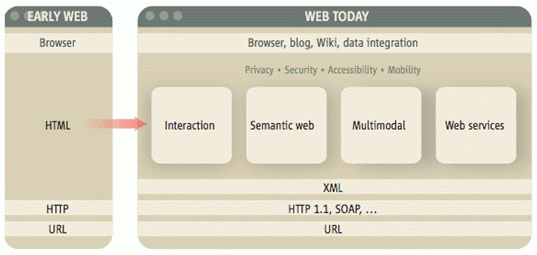ECS Intranet:
Web Science
The Web has developed dramatically in a short space of time. It is now the world’s most complex technological construct and has evolved far beyond its origins as a simple document browser (see figure below). Web Science is an amalgam of analysis and synthesis: analysing the Web to track its development and understand its use and significance, and then synthesising new tools, languages and standards to facilitate new creative use.
The Web is defined by a few simple rules which give rise to highly complex structures. Many new structures are changing the ways we think of the Web: for instance Web services, pervasive (or ubiquitous) computing, and Web 2.0. Web Science is intended to get to grips with the relationships between the simple rules and the complex behaviour, to identify trends that could threaten or fragment the Web, and to contribute to the research required to ensure its continuing development.
IAM’s research has focused on the ability to keep information and links separately (open hypermedia) so that it can be personalized to each user (adaptive hypermedia) using sophisticated models of the meaning of documents, data and their interconnections (the Semantic Web). Many systems that the Group has built have been used for engineering, publishing and education, and have helped shaped current Web standards. Meanwhile, the group has always been in the forefront of development of the Semantic Web as a means of shifting the focus of the Web from documents to data.
One very exciting development at the core of Southampton’s research in this area is the Web Science Research Initiative, a joint venture with the Computer Science and Artificial Intelligence Laboratory at the Massachusetts Institute of Technology. The goal of WSRI is to facilitate and produce the fundamental scientific advances necessary to inform the future design and use of the Web.

Research Areas
Semantic Web Tools
The development of tools to allow the presentation of information in context, and to allow a richer querying experience.
Semiotic Dynamics
Understanding how meaningful relations evolve over time in populations, by gathering datasets from, e.g. collaborative tagging systems, and analysing them using methods and tools from complex systems analysis.
Hypermedia
Using hypermedia in combination with database and information retrieval technology to facilitate group working, report writing, and navigating through large repositories of information.
Trust and Provenance
Inference performed over information gleaned from a range of sources is only as reliable as the least reliable source. Hence it is essential to develop methods for investigating the provenance of information, and of judging how reliable inferences over heterogeneous information sources are. For more details of the Group's work in this area, please see the Trust and Provenance theme.
Projects
- ADAPT: Adaptivity and adaptability in ODL based on ICT.
- AIMS: Academic Information Management Systems
- Collaborative Orthopaedic Research Environment
- doingPad
- Equator
- FIRM: Factory Information Resource Management
- Grid-Enabled Data Collection and Analysis - Semantic Annotation in Skills-Based Learning
- Management Reporting System
- Market-Based Recommender Systems
- MIMEX: Multivariant Information Management and Exploitation
- mSpace - improving access to information for building new knowledge
- mSpace Mobile: exploratory search in the palm of your hand
- OntoMediate: Ontological Mediation and Semantic Gateways for Domain/Enterprise Translations
- Open Impact
- Perspectives in Electronic Publishing
- ReSIST: Resilience for Survivability in IST
- SEMIOTIKS: Semantically-Enhanced Information Extraction for Improved Knowledge Superiority
- TAGora - Semiotic Dynamics in Online Communities
- Virtual Orthopaedic European University
- WiCK: Writing in the Context of Knowledge

